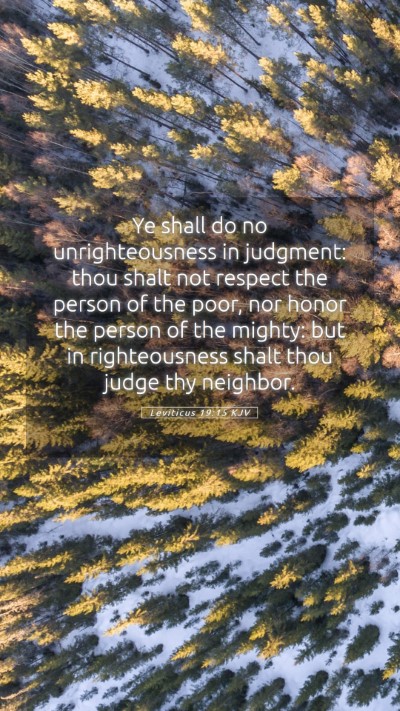Understanding Leviticus 19:15
Bible Verse: Leviticus 19:15
"You shall do no injustice in court. You shall not be partial to the poor or defer to the great, but in righteousness you shall judge your neighbor."
Bible Verse Meaning
The verse demonstrates a fundamental principle of justice within the community of Israel, highlighting the importance of impartiality and fairness in legal matters. It brings to light two critical aspects:
- Impartiality: Following the law should not be influenced by social status—neither favoring the poor nor giving preference to the wealthy. This reflects God’s nature of fairness and equality.
- Righteousness in Judgement: True justice stems from upholding righteousness, which demands integrity and moral clarity in all judgments made concerning one’s neighbor.
Commentary Insights
According to various public domain commentaries:
Matthew Henry:
Matthew Henry reflects on the necessity of maintaining justice in human affairs. He emphasizes that judgments should be based on the merit of the case rather than the social status of those involved. He cautions against the biases that can arise from wealth or poverty, reminding readers that all individuals are made in the image of God and should be treated with equality. Furthermore, he notes that the instruction serves to maintain social order and collective well-being.
Albert Barnes:
Albert Barnes expands on the implications of this verse by discussing the dangers of prejudice in society. He illustrates that showing favoritism is not only a societal ill but also goes against the divine mandate for justice. Barnes explains how this principle is crucial, both in ancient and modern contexts, as it underscores the essence of societal integrity. He stresses the importance of weighing cases fairly, without bias, and upholds the moral standard of judging one's neighbor with integrity and thoughtfulness.
Adam Clarke:
Adam Clarke provides a detailed analysis of the context in which this directive was given to the Israelites. He explains that this verse aimed to foster an equitable legal system among God’s people and to remind them of their accountability to God. Clarke emphasizes that this injunction is a reflection of God's perfect justice, making it imperative for believers to emulate this trait in their personal and communal dealings. He further clarifies that the essence of this verse extends beyond mere legal proceedings to the broader ethical conduct among individuals.
Application of the Verse
The insights gleaned from Leviticus 19:15 can find application in contemporary society. The ethical calling to act justly and without favoritism resonates deeply within community interactions, whether in the courtroom or daily life. For Bible study groups and individuals engaging in online Bible study, meditation on this verse presents a guiding principle on the significance of justice and integrity in personal conduct.
Cross References
- Proverbs 18:5 - "It is not good to be partial to the wicked or to deprive the innocent of justice."
- James 2:1 - "My brothers, show no partiality as you hold the faith in our Lord Jesus Christ, the Lord of glory."
- Deuteronomy 1:17 - "You shall not be partial in judgment. You shall hear the small and the great alike."
Conclusion
Leviticus 19:15 serves as a powerful reminder of the essence of fair justice, reflecting a core value of biblical teachings. Such principles are not only central to the ancient Israelites but remain relevant today as we strive to reflect God's justice in our lives. By understanding and applying the meaning of this Bible verse, individuals can contribute to a more just and equitable society.
Further Study
For those interested in Bible study resources, consider leading discussions on the implications of justice in the Old Testament, exploring how it translates into contemporary issues. Utilizing Bible study tools and Bible study guides can enrich the understanding of other related passages and encourage deeper reflection among participants.


